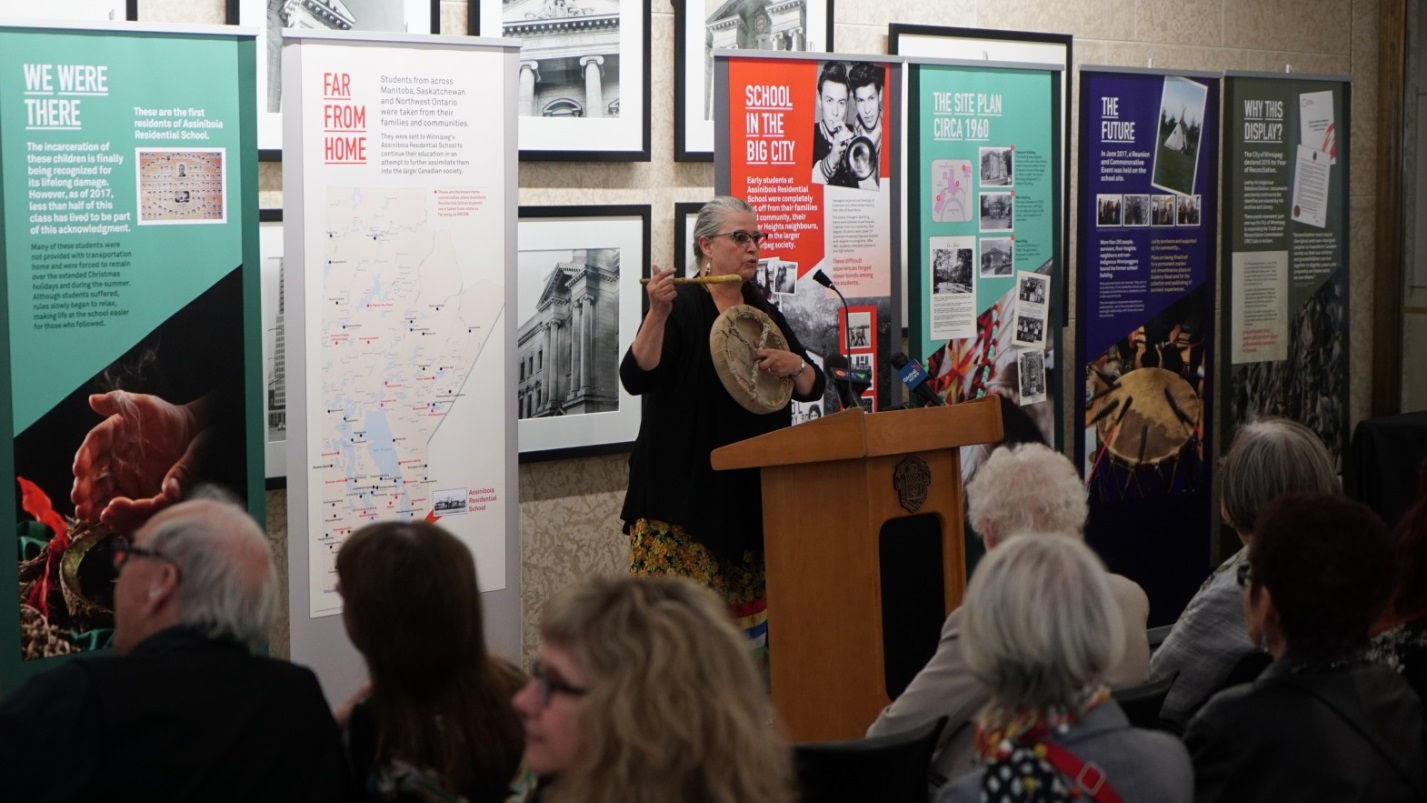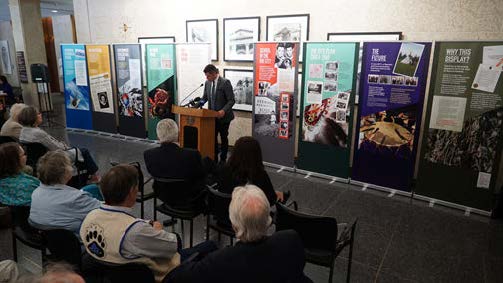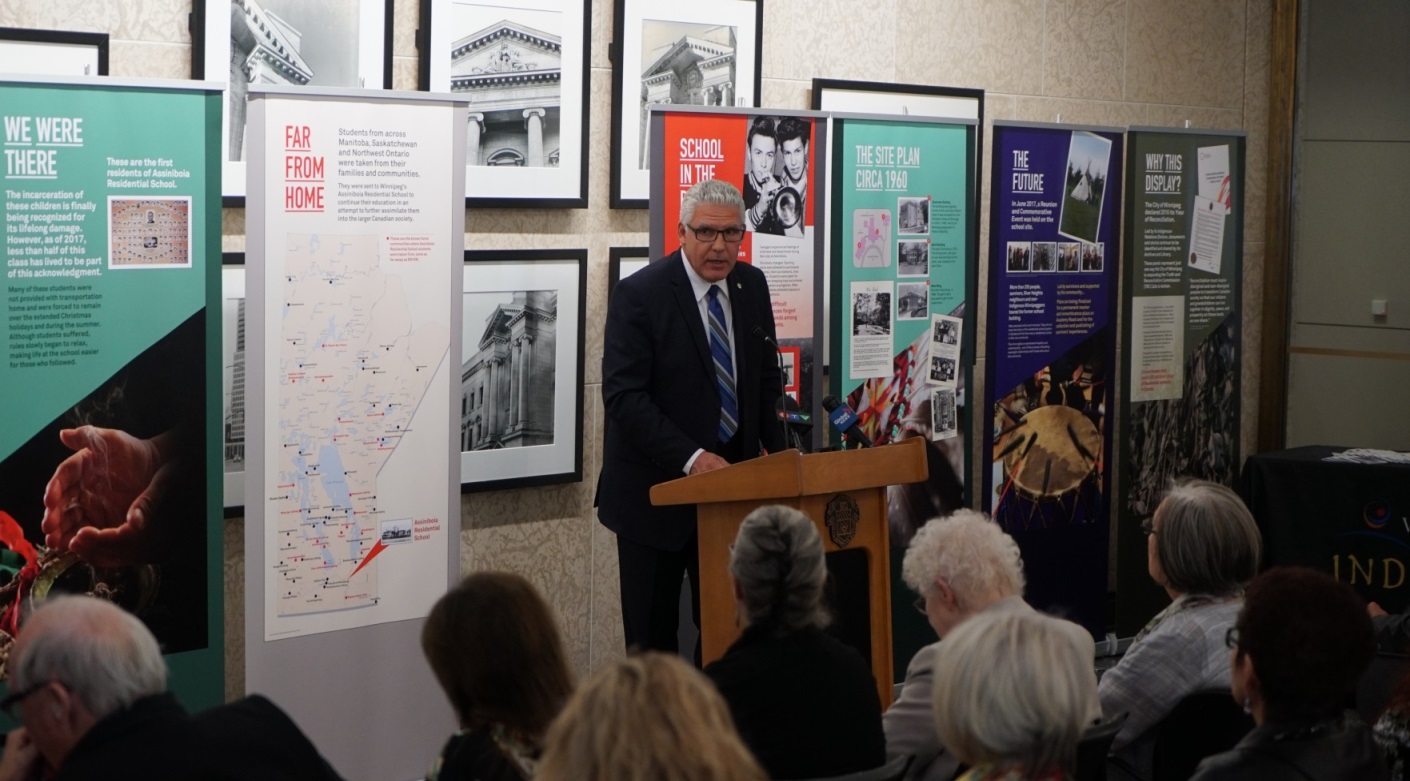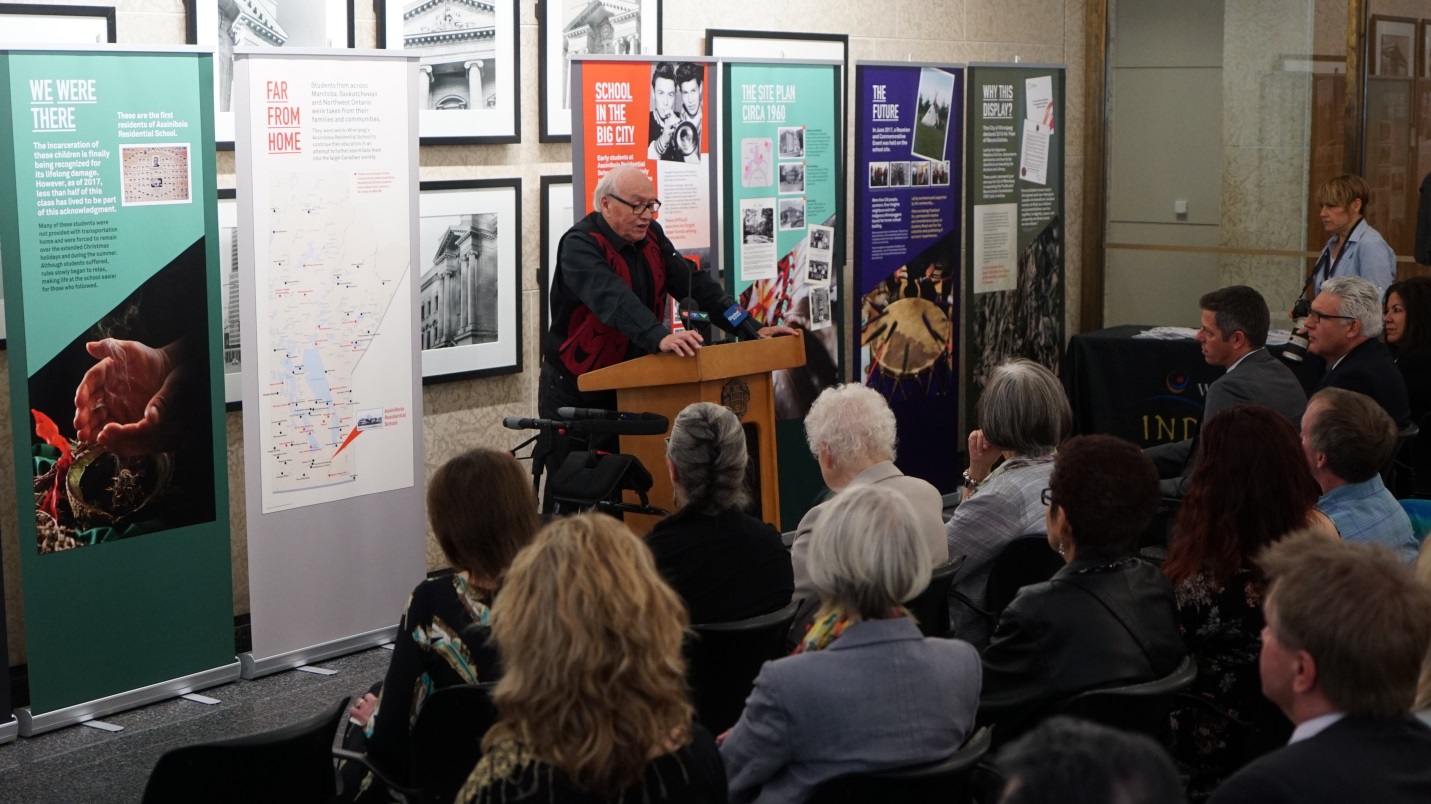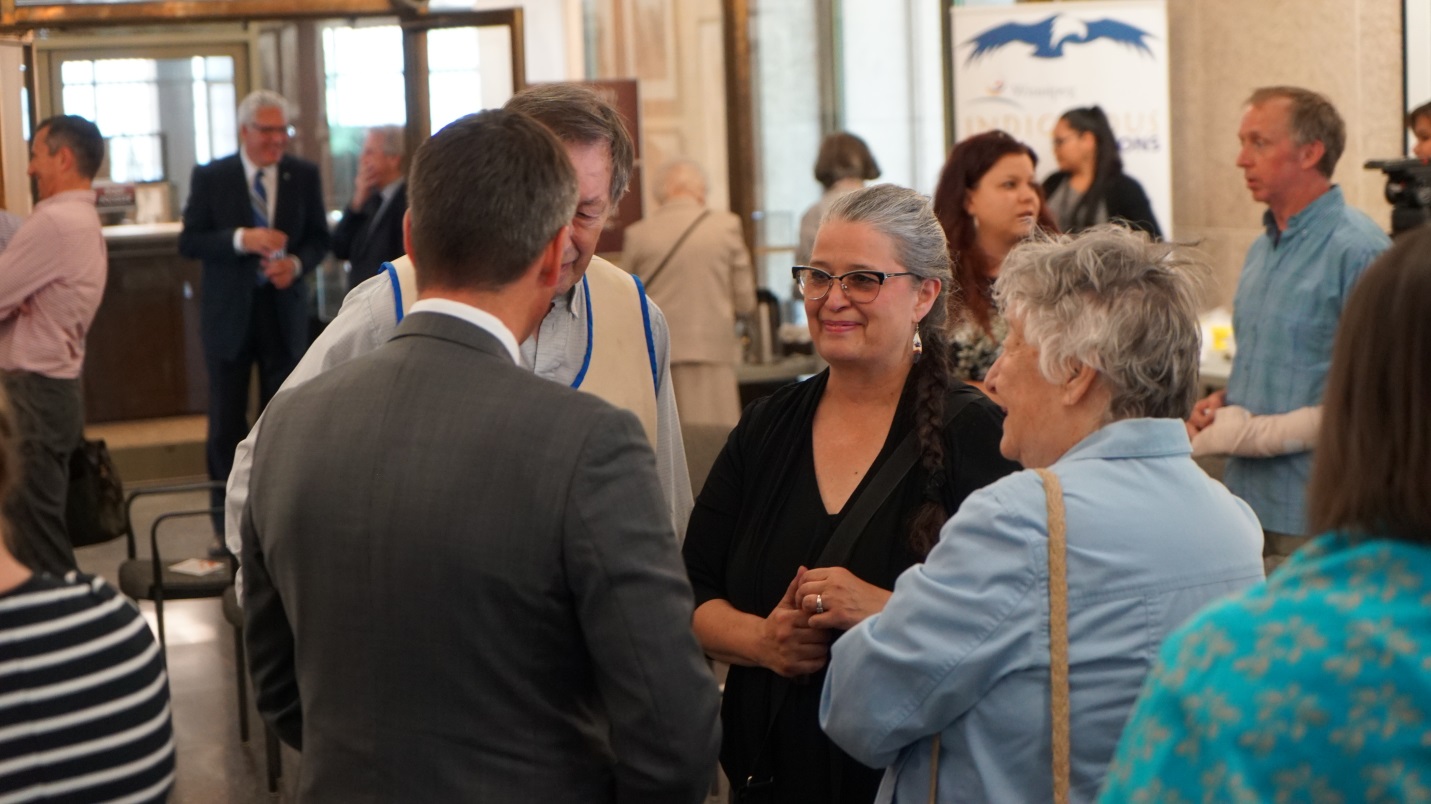
Journey of Reconciliation
Activity Summary
- In collaboration with the City of Winnipeg's Indigenous Relations Division (IRD) and the University of Winnipeg's Master's in Development Practice (MDP) in Indigenous Development studies completed a research project outlining recommendations on City of Winnipeg initiatives, policy changes or enhancements for consideration of implementation of the United Nations Declaration Rights of Indigenous Peoples.
- A working group comprised of Indigenous Employee Group members and staff from the Indigenous Relations Division was formed to review recommendations put forth by the students of the MDP.
- The working group conducted a further internal review of the 2016 City of Winnipeg Indigenous-specific initiatives to further produce a work plan and activities are ongoing.
- Other actions taken by the Indigenous Relations Division and in collaboration with other departments supporting Call to Action #43 include:
- IRD meets regularly with policy groups and OurWinnipeg groups to discuss how to incorporate an UNDRIP lens to policy-driven documents.
- Due to the complexity of this Call to Action, the City of Winnipeg continues to collaborate and participate in learning engagements to enhance the capacity related to this Call to Action.
- In identifying smudge-friendly City spaces, a working group visited City of Winnipeg facilities to assess the requirements for accommodating smudge and pipe ceremonies.
- IRD provides advice and guidance to City departments to embed an indigenous lens in civic events and an Indigenous lens concerning day to day business.
- Due to the complexity of this Call to Action, the City of Winnipeg's Indigenous Relations Division seeks learning opportunities for growth and capacity to implement this Call to Action by:
- Collaborating with the Legal Services Department to research federal and provincial and historical legislation that may impact modification of City of Winnipeg policies and bylaws.
- Hosting/participating in development and learning opportunities such as inviting guest speakers and subject matter experts including Dr. Brenda Gunn, Associate Professor of Law at University of Manitoba to provide insight into the Doctrine of Discovery as it relates to the municipalities.
- As of December 2018, over 8000 employees have participated in the mandatory Indigenous awareness training opportunities including:
- A two day (Chi Ki Ken Da Mun) and ½ day (W'daeb Awaewe) sessions with content that provides an experiential approach to understanding Indigenous culture and promotes reconciliation and the spirit of inclusion. The teachings provide insight from an Indigenous perspective on culture, traditions and historical events in Winnipeg with a focus on the Residential School System and the impacts on Indigenous peoples.
- The Leadership Series provides educational opportunities, including Indigenous-related topics, for civic leaders to better understand their roles and responsibilities. Indigenous-led reconciliation topics have included:
- Dr. Ry Moran, Director of the National Centre for Truth and Reconciliation, presented on the 5 Truth and Reconciliation Calls to Action related to municipalities.
- Loretta Ross, Treaty Commissioner of Manitoba, presented on the Manitoba Treaties.
- Dr. Brenda Gunn, Associate Professor of Law at University of Manitoba, presented on the United Nations Declaration on the Rights of Indigenous Peoples (UNDRIP).
- Dr. Keven Lamoureux, former Associate Vice President of Indigenous Affairs, University of Winnipeg presented on reconciliation.
- As of October 2018, over 450 have visited City of Winnipeg information displays including the:
- Assiniboia Residential School (ARS) Exhibit; and
- Red Road Lodge Story Posts Project Exhibit
- IRD continues to coordinate Indigenous cultural and ceremonial educational and awareness opportunities including solstice feasts, moccasin making workshops, medicine picking and opportunities to connect with Indigenous Elders. Traditional medicine gardens have been planted at City Hall, the Millennium Library and North Centennial Leisure Center to provide a space for connection to Traditional ceremony and medicines. Some of the plantings took place with blessings and teachings from an Elder.
Assiniboia Residential School Exhibit
As the City of Winnipeg continues on the Journey of Reconciliation, so do the efforts of carrying out initiatives and projects stemming from the Truth and Reconciliation Commission's Calls to Action and the City's commitment to educate its public service on the legacy of the Residential School era which also includes knowledge of local history.
On June 4, 2018, the City of Winnipeg's Indigenous Relations unveiled a 9 panel exhibit that will inform and educate employees and the public on the Assiniboia Residential School. The unveiling included an Opening Prayer, greetings from Mayor Brian Bowman and CAO Doug McNeil and remarks from Guest Speaker Ted Fontaine from the Assiniboia Residential School Governing Council.
This project was made possible with the support of City of Winnipeg Archives, Planning, Property and Development and the Winnipeg Public Library. Special acknowledgements to Assiniboia Residential School Survivors graduates, and the Assiniboia Residential School Governing Council for all of their knowledge and for sharing their stories with us.
There were 17 federally funded Indian Residential Schools in Manitoba which included one location in Winnipeg known as the Assiniboia Indian Residential School. Federally funded and operated by the Grey Nuns and Oblate Fathers, the Assiniboia Indian Residential School was part of the federal government's educational system under the Indian Act which operated from 1958 until June 1973. The school still stands today and now functions as the Canadian Centre for Child Protection including Child Find Manitoba, the official address is 615 Academy Road of River Heights.
In addition to an ongoing commitment to the Journey to Reconciliation, the following are some of the initiatives the City is currently working on visit http://www.winnipeg.ca/indigenous/reconciliation/
- An identification process has been updated so that City cemeteries can work with other Manitoba cemeteries in identifying burial sites without having to re-direct families.
- Cemeteries designed a process to enable City cemeteries to share information with other Manitoba cemeteries in order to assist families with a one-stop service.
- The City of Winnipeg Archives completed researching archives related to residential schools and their legacies, digitized and transferred to the National Centre for Truth and Reconciliation.
- The Archives and Record Control Branch has prioritized processing of record series that led themselves to the exploration of Indigenous histories in the City, and of civic policies, programs, and decisions that affected Indigenous communities within the City.
- Archives also produced a Research Guide on Indigenous Peoples and History available on the City of Winnipeg website, to date this report has been updated twice and completed work on a master inventory of photographs held by the Archives that document Indigenous peoples and communities in Winnipeg.
- Archives also implemented new procedures for reporting on records that document Indigenous peoples and communities when record series are processed – during processing of the records of the Standing Committee on Legislation and Reception, 1895-1971, the Archives identified records that could potentially be used in exhibits exploring changing perceptions of the North-West Resistance, the Metis Nation, and the actions of the Canadian government during that period.
Other TRC Calls to Action Include
– Calls to Action 7, 23, 92
This grant program provides resources to youth-serving agencies to deliver employment development and recreation programs, and to civic departments to create opportunities for Indigenous youth such as internships, training programs, career camps, summer work placements, and post-secondary scholarships and community leadership through scholarship programs.
- Since 2009, the City's Indigenous Youth Strategy annually supports over 300 Indigenous youth in employment development, training, lifelong learning, recreation, and scholarship and award programs.
- Since 2011, over 38 Indigenous youth have been hired by the City of Winnipeg as a result of their civic work placement, internship, or as a graduate of the 2014 Winnipeg Fire Paramedic Service Primary Care Paramedic program in partnership with Oshki Annishinabe Nigaaniwak.
- For more information on Oshki Annishinabe Nigaaniwak initiatives: visit here.
Winnipeg's Indigenous Accord is a living document to guide our shared commitment to the Journey of Reconciliation in Winnipeg. Our shared commitment is rooted in the Truth and Reconciliation Commission's (TRC) 94 Calls to Action and is guided by the commitments and principles contained in the Accord. Embedded in the TRC's 94 Calls to Action is the importance of committing ourselves as a city to the ongoing, long-term process of reconciliation. For more information: visit here.

